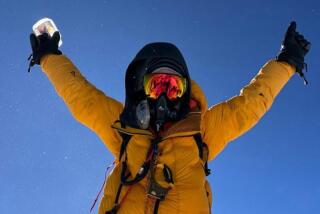Ailing and Trapped at the Bottom of the World
- Share via
DENVER — Barry McCue kept telling himself that the pain was a bad case of indigestion. After all, he was at the South Pole in the dead of winter and being seriously ill really wouldn’t do.
McCue put up with the pain as long as he could -- an hour. Then he stumbled into the doctor’s office at the U.S. Amundsen-Scott South Pole Station, where he was living and working with 57 other people in darkness that lasts for months. It was Aug. 25.
Over the next three weeks, an extraordinary rescue effort was mounted to get McCue, 51, from the South Pole to a Texas hospital for gallbladder surgery to save his life. Doctors thousands of miles away assessed his deteriorating condition by computer and rescue planes were flown in from Canada, only to be grounded by a howling storm that lasted for days.
McCue is the third person since 1999 to be evacuated from the South Pole station because of a medical condition. Until last week, he had remained anonymous to protect his children Leslie, 19; Matt, 23, and Jenny, 24, from publicity. Their mother died six years ago in a car accident.
On Wednesday, he described his ordeal in a telephone interview after a doctor’s appointment in Chicago. By his side was Jenny, relieved to have him safe, sound -- and home.
“It was crazy because this amazing international thing is going on, but all I cared about was we have to get my dad home,” she said. “It was a very long, sleepless four weeks. It’s good now because he’s here. It’s like a wave of relief.”
McCue, a safety expert with experience in the nuclear power industry, arrived at the South Pole station early this year as the environmental safety and health coordinator. His employer was Centennial, Colo.-based Raytheon Polar Services Co., the logistics contractor for the U.S. Antarctic research program managed by the National Science Foundation.
Seven months later, McCue arrived in the doctor’s office with a sharp pain in his stomach. The physician immediately thought heart attack, but it turned out that the problem was with McCue’s gallbladder: It was blocked with stones and infected.
McCue was stable and the base doctor thought that he could make it until the first week of November, when the weather begins to let up. Then came the second attack Sept. 5, and things grew far worse.
McCue’s gallbladder had begun to affect his pancreas. After performing an ultrasound guided by experts who watched via a real-time Internet connection from hospitals in the United States, the base doctor decided that McCue had to be evacuated from one of the most remote places on Earth -- immediately.
“If my pancreas had been further blocked, they would have been looking at where to store my body,” McCue said.
Carpenters at the polar station worked for three days in temperatures of 90 degrees below zero to build smudge pots that pilots would need to land in the darkness. It took four days to groom the runway with snow machines leaking hydraulic fluid from lines turned brittle by the cold.
“It got to 102 degrees below zero,” McCue recalled as he sipped tea at a Starbucks. “When you take your gloves off, in five minutes, the pain is brutal.”
McCue was determined not to pressure the people working to rescue him.
“My attitude in this whole thing was to stay cheerful and happy, like it’s not a big deal,” he said. “People were working in extreme conditions. I wanted to keep it calm so they could take their time.”
As the work dragged on, pilots from Calgary’s Kenn Borek air charter service arrived at Antarctica’s Rothera Air Base, about 1,400 miles from the South Pole. They were stuck for five days at the British base, waiting for winds at the pole to die down.
Finally, on Sept. 21, a rugged Twin Otter twin-prop plane landed at Amundsen-Scott at 10 a.m. South Pole time. The pilots ate breakfast and went right to bed.
“Those guys are great,” McCue said. “They had just flown 10 hours through the roughest environment known to man.”
Ten hours later, McCue boarded the plane, where he shared space with the fuel tanks that had been installed in place of seats and settled in for the noisy flight back to Rothera. They arrived just ahead of a blizzard, leaving McCue barely enough time to grab a sandwich before he was whisked off to Chile and finally to the United States.
The daring rescue finally ended Sept. 25 with successful surgery at the University of Texas Medical Branch in Galveston. Doctors removed his gangrenous gallbladder and cleared stones from his bile duct.
Now he is recovering with the help of his eldest daughter, who says she is on “dad duty.” Her father said he is ready for his next adventure, when his doctors -- and his daughter -- give him the go-ahead. He has left Raytheon and is taking project management courses at Northwestern University.
“I’ll apply to be a project manager somewhere in the world,” McCue said. “I don’t want France or Germany or something like that. I don’t want civilization. If it’s got malaria, it’s good.”
More to Read
Sign up for Essential California
The most important California stories and recommendations in your inbox every morning.
You may occasionally receive promotional content from the Los Angeles Times.










